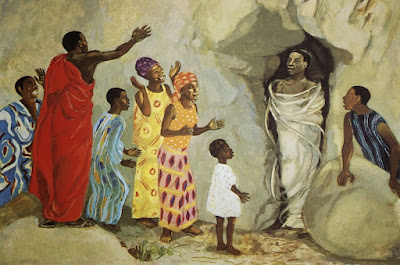Trigger Warning: Sexual Assault
First reading contains incident of rape, incest, and parental neglect. However, it's important to read all of the readings beforehand.
Inspired by 2 Samuel 13:1–16, 21–22; Psalm 103:1–17; 1 Thessalonians 2:9–12; and Mark 10:13–16, from Wilda Gafney's A Women's Lectionary for the Whole Church.
After today, you can’t ever say that I save the hardest readings for Pastor Al! Lord have mercy. What am I going to do with this? Is what I asked myself this week! Well, here we go. At first, I thought I was going to go with the topic of family, which is very strong throughout all the readings. And it certainly may come up again, but I wanted to go a little deeper than that because we all have such varied experiences with family. For some that very word is a trigger word associated with abuse and neglect. And for others, it is the very definition of grace, and everyone in between. Going deeper than just family allows us to come at these readings on ground that’s at least a little more level. And so, I’d like us to explore these three concepts together: respect, honor, and status; through today’s readings.
We’ll begin with our first reading and end with our Gospel reading, so let’s get this first one out of the way. Yikes. As you may have guessed, this reading from Second Samuel does not appear in any other lectionary. And this time I don’t blame them! I mean, who wants to talk about this on any day, in any place, much less in church on Sunday? Well, I do. I mean, I don’t want to, but I firmly believe that we must, especially on this most holy of days, in this most holy of places—because if we don’t bring our deepest hurts here, among the gathered body of Christ, how can we ever expect healing to happen out there? If we continue to pull the curtain between God and those things we don’t like to talk about, how can healing happen? Think of it this way.
Imagine if racism was battled in pulpits across North America fifty years ago, a hundred years ago, five hundred years ago! Imagine how different our world might be today, if the pain of racism was called out by pastors across our nation beginning when European settlers stole their first plot of land in the Americas. The same could be said about sexism during Women’s suffrage movements at the turn of the last century, or any time in history actually, if people heard women lifted up by the all-male pastor’s club of the day. Here’s one last example, imagine if in the decades leading up to the AIDS epidemic, pastors spoke out against homophobia, right from their pulpits! I don’t think it’s too dramatic to wonder how many lives that could have saved, but instead we turned it into a “gay disease” that no one wanted to talk about, including the church.
And as for the topic found in today’s first reading, what happened to Tamar is all too common today. I won’t ask for a show of hands, but so many of us know someone who has endured the same fate as Tamar. And did you notice just how similar the reaction was then compared to today? The amount of silence within the story? Her mother was nowhere to be found. Her dad was more concerned about protecting his son. A friend of the family who turned out to be an accomplice to this horrific crime. If you didn’t know better you’d think this was an episode of Law & Order: SVU, but unfortunately, it is a reality for far too many of our loved ones. The creator of this lectionary, the Rev. Dr. Wilda Gafney, selected this as our first reading today, not to torture us, but to give us an example of how this shouldn’t have played out.To show us what it looks like when respect, honor, and status, are completely absent. To show us what it looks like when someone’s humanity is completely stripped of them. Whew! Ok, I think that’s enough of that story. Our Psalm for today was a beautiful response to our first reading, giving us the opposite of what we had just experienced. There, our Psalmist gives us the image of God who is not only wise and loving, not only our merciful redeemer and provider, but does so as our Mother, whose love flows from God’s very womb. And even names that love that comes from her womb, us. We are that love that comes from her womb. What a profound contrast to that first horrific reading. Because here God is the perfector of respect, honor, and status, lifting us up, as a mother lifts up her baby.
As we move to our next reading, Paul continues this image of parental love but with a twist! Paul presents this kind of parental love as not just something between biological relatives, but as something that we actually get to choose! What Gafney calls, “families of choice.” I know for a fact many of you know that kind of love and how special it is. Whether you were adopted, officially or unofficially, by someone, or you were the one who took someone in as your very own. The selection of this reading creates this brilliant segue to our Gospel reading, where we have a very familiar story. Mark shares this little scene well into his book. So, by this time the crowds following Jesus are huge, and whole families are joining the crowd, kids and all.
And of course, like many religious celebrities or politicians, parents started bringing their kids to Jesus for him to hold. Think: the Pope blessing kids or presidents kissing babies. I don’t how those ever became a thing to begin with but parents just love doing that! I don’t know if popes and presidents like that, but I can tell who didn’t, Jesus' disciples, his closest followers, his inner circle. They said, “Uh uh, get your kid’s dirty mitts off him! You have any idea how hard it is to keep his tunic white!” Ok, I’m slightly paraphrasing there. Point is, they weren’t having it! And Jesus got angry. What?! Jesus was allowed to get angry? Yes, and so are you! In fact, I think God counts on it! But that might be for another sermon. Jesus corrects them and asks them to bring the kids to him, and then says something really odd.
He said that it was to kids like those “that the realm of God belongs…[that] whoever does not receive the reign of God as a little child will never enter it.” Now, why is this so odd? I mean, maybe he’s just good with kids. What’s the big deal? Well, in that day, children weren’t thought of in the same way we think of kids. Today we sing about how kids are our future. Then, they sang about how their sons were gonna join the workforce in a few years, or how their daughters were gonna bring them a hefty dowry! Oh, I’m sure they loved their children, it was just different. There was very little respect, honor, and status afforded children. They had about as many rights as a woman, and not much more than slaves. You’ve heard that old adage, “Children should be seen and not heard.” It was like that only on steroids.
So, when Jesus corrected them, and told them to bring the kids to him, to allow them to cut to the front of the line, and then tops that off with, these are who the realm of God belongs to, he is completely turning respect, honor, and status on their head! Those disciples must have felt like they were in the Twilight Zone! In your mind's eye, picture this, you show up at Thanksgiving dinner, and you walk in and see all the kids are sitting at the main table, and all the adults are sitting at the little plastic kiddie table complete with mini plastic chairs. And no one is complaining about it! They're just chowing down on their turkey and mashed potatoes like this is all normal, while the adult's legs have gone completely numb before they could even get seconds. That’s the best modern-day example I could come up with!
That’s how strange this was to them! But telling them, that unless they became like these little kids, they wouldn’t enter the reign of God? That was the real kicker! To imply that these kids, who were given little to no respect, honor, or status, had something to teach those crusty old disciples? That must have felt like a low blow. But then I remember just how much my own children have taught me, how they have made me a better human being, and how they came out of their mother’s womb, free of judgment, free of bias, free of all the isms that we adults are so susceptible to, and I understand what Jesus meant. And then we’re led to wonder, where in God’s world does respect, honor, and status, need to be turned on their head? And who is there to teach us something about the reign of God?
Palestinian children? Yes. Israeli civilians? Yes. Ukrainians? Yes. Black and brown people in the U.S.? Yes. Women in states who’ve lost the right to their own bodies? Yes. Trans people? Yes. Drug addicts? Yes. Alcoholics? Yes. Neurodivergent people? Yes. Bipolar people? Yes. The unhoused? Yes. I’ll let you add to that list on your own time. These and more, are groups of people in our society that don’t get a whole lot of respect, honor, or status, if any. Now imagine if we flipped that on its head the same way Jesus did.
Imagine if we, all of a sudden, put them at the front of the line. Imagine if we, had the courage to talk with them like the human beings they are. Imagine if we listened to their stories, to their journeys, to their heart. Imagine what they could teach us, what they could teach us about respect, honor, and status. May we find the courage to turn respect, honor, and status on their head when the need arises—in the same way that God has already done for us—like a loving mother, showering us with unconditional love, whether we deserve it or not. Thanks be to God. Amen.






